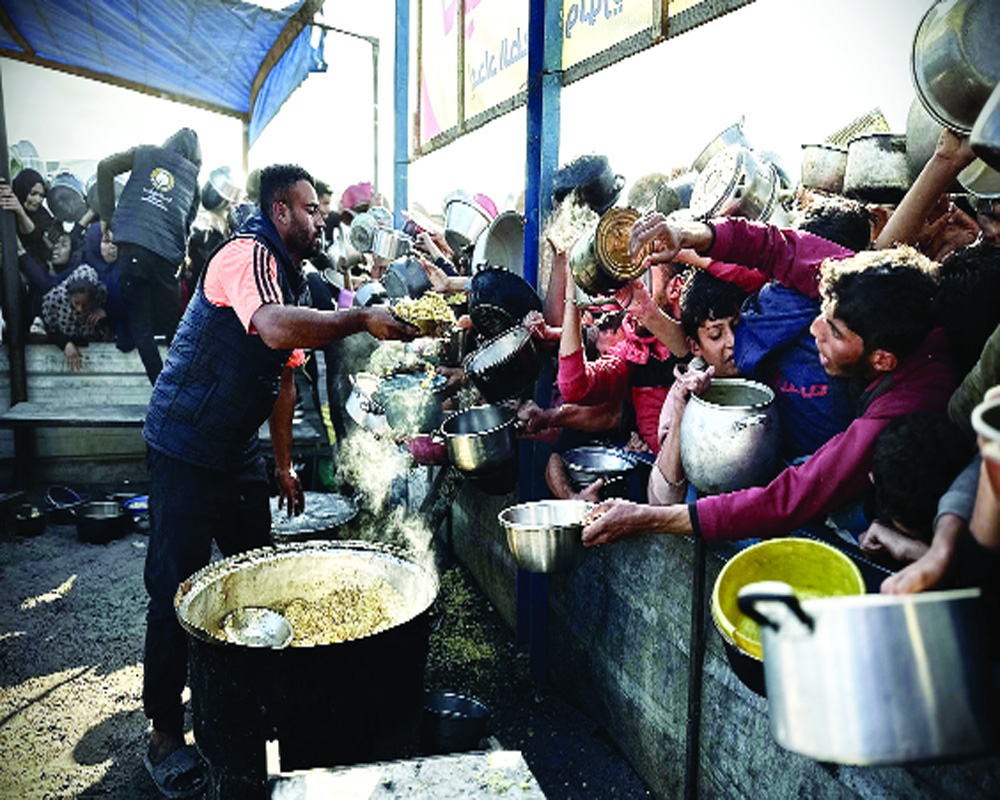In a world dominated by geopolitical rivalries, economic uncertainties and environmental degradation, food security concerns are relegated to background
World politics today faces a myriad of challenges, including cyber fraud, widespread corruption, trans-national terrorism, and the relentless use of weapons of mass destruction in regional conflicts such as the West Asian crises and the ongoing Ukraine-Russia war. These issues are compounded by a refugee crisis of enormous proportions, environmental degradation, and the growing frequency of natural disasters. Among these pressing concerns, food security remains a critical yet often overlooked challenge that affects nations worldwide.
Food security, as defined by the Food and Agriculture Organization (FAO) of the United Nations at the 1996 Rome World Food Summit, exists when “all people, at all times, have physical and economic access to sufficient, safe, and nutritious food that meets their dietary needs and food preferences for an active and healthy life.” This definition underscores the importance of not only physical availability but also economic access to food, emphasising both quantity and nutritional quality.
According to the FAO’s Food Insecurity Scale, over half of the population in low-income countries lives under food-insecure conditions, with about one-third facing severe crises. Globally, approximately 789 million people lack adequate food, and this number rises to an alarming 2.4 billion when micronutrient deficiencies are considered. Food security issues can be categorised into two broad areas: quantity and quality. These challenges encompass five key dimensions: food availability, price volatility, inclusive access, proper utilisation, and stability. Price volatility, particularly in low-income countries, exacerbates food insecurity as most people lack the resources to access nutrient-rich food. Recognising the severity of global food insecurity, the United Nations included food security among its 17 Sustainable Development Goals (SDGs) in the 2015 ‘2030 Agenda’. The second SDG aims to “end hunger, achieve food security and improved nutrition, and promote sustainable agriculture.” Complementary goals, such as SDG 6 (“Ensure availability and sustainable management of water and sanitation for all”) and SDG 12 (“Ensure sustainable consumption and production patterns”), further emphasize the need for sustainable practices in achieving food security. Governments worldwide have been urged to align their food and agriculture policies with these goals to ensure their populations receive adequate, nutritious food in a sustainable manner.
Food insecurity leads to numerous problems at both household and societal levels. Household food insecurity, for instance, has been linked to suboptimal sleep patterns and reduced immunity against diseases.
To address these issues, the United Nations reaffirmed its commitment to safe and nutritious food access during the 2012 UN Conference on Sustainable Development. This commitment was encapsulated in the ‘Future We Want’ document. The conference also saw the launch of the ‘Zero Hunger Challenge’ (ZHC) by then-UN Secretary-General Ban Ki-moon, aiming to eliminate hunger and malnutrition globally by 2030. A cornerstone of the ZHC is the goal to make “all food systems sustainable,” encompassing clean water, sustainable energy, responsible food consumption and production, and climate action—achievable through national policies and international cooperation.The 1987 Brundtland Report, titled Our Common Future, defined sustainable development as “development that meets the needs of the present without compromising the ability of future generations to meet their own needs.” India, since its independence in 1947, has made significant strides in building food security by establishing agricultural institutions such as the Indian Agricultural Research Institute under the guidance of the Indian Council of Agricultural Research (ICAR).
Advancements in genetic engineering and biotechnology hold promise for addressing agricultural challenges, improving food quality, and increasing global food availability. However, concerns persist about biosafety risks posed by genetically modified organisms (GMOs). Proper handling, transfer, and disposal of these organisms, as recommended by global institutions like the World Bank, are critical to ensuring safety.
The world is currently mired in geopolitical rivalries, with nations prioritising dominance over addressing pressing issues such as hunger, poverty, environmental degradation and unemployment.
Biotechnology, if harnessed effectively, can address these challenges by creating opportunities for producing higher-quality food, reducing pollution, generating jobs, and fostering economic growth. This, in turn, could promote international cooperation and reduce global tensions, paving the way for peace. Investments in research and development can yield innovative solutions to hunger, malnutrition and food adulteration, transforming biotechnology into a force for global good.
However, two major apprehensions regarding biotechnology persist. First, it may deepen the divide between developed and developing nations. Second, globalisation could threaten the survival of indigenous food industries. Despite these concerns, the potential benefits of biotechnology in transforming global food and energy systems into a philanthropic movement cannot be overlooked. Food security initiatives must rise above geopolitical rivalries, embracing inclusivity and shared responsibilities. India, with its emphasis on inclusive diplomacy, has the potential to play a pivotal role in this endeavor.
(The author, a recipient of the Bharat Gaurav Award, is a professor, HOD, and an expert on strategic affairs. Views expressed are personal)


























